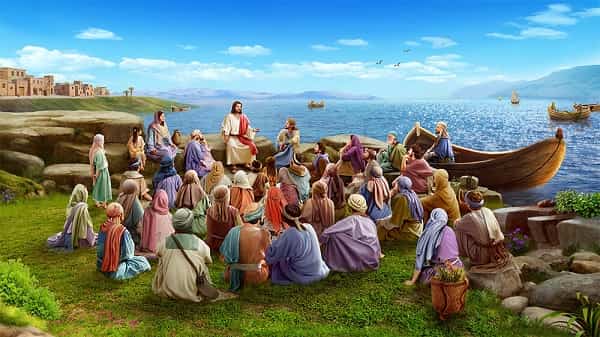
3 Ways to Find Clarity from God
Figuring out God’s plan for you can be difficult. Here are 3 ways to help find clarity in those decisions, big or small.
As followers of Jesus, we need to take our troubles to Him when we face hard times. But sometimes deciphering what He’s really telling us to do can feel difficult. If we want to rely on God and follow His plan, we have to learn to find clarity in what He’s telling us. Below, you’ll find 3 steps to find clarity from God.
Step 1: Start with Scripture
-
The first place to start when looking for clarity in our own situations is the Bible. When we start with Scripture, we can know that our foundation is in God’s Word. Then we can check our hearts and desires against God’s (Jeremiah 17:9).
If you’re looking to learn more about reading the Bible, join our Bible Discovery class, happening in-person and online soon! Or jump into a Bible Reading Plan and commit to reading God’s Word daily.
Clarity
Step 2: Find and Build A Trusted Community
It’s easy to make unwise decisions in a vacuum. Surrounding yourself with people you trust who also trust in Jesus can help when trying to figure out what God is telling you. Like it says in Proverbs 11:14, wise counsel can bring safety and clarity to your life and point you back to God.
An easy way to find your people is to join a Group! Find one that works for you using ICB’s Group Finder.
Step 3: Listen to God’s Voice
When we look to God for answers, one of the best choices we can make is to be still and listen for His voice. That means slowing down, silencing our heart, removing our screens, and really listening for what He’s telling us. God rarely speaks in a booming voice—we have to quiet ourselves to hear Him clearly.
No matter what situation you’re facing, you can always depend on God’s faithfulness and love for you. If you’re wondering how to practically hear from God, check out this article
on 3 Ways We Can Hear God’s Voice.
Seeing Jesus with Clarity
Though it is quite clear that the gospel authors did not compose their works with a strict chronology in mind, this does not mean that they were arranged haphazardly. The gospels were assembled with careful forethought, often to draw out certain theological themes. For example, right in the middle of Mark 8, Mark juxtaposes several stories together, which at first glance may seem to have nothing to do with one another. First, there is a conversation between Jesus and His disciples in a boat on the way back after a testy exchange with the Pharisees. Jesus warns them, “Beware of the yeast of the Pharisees…” (v. 15). The disciples are puzzled by this remark, assuming He is referring to literal bread.
In His reply, Jesus asks them, “Do you have eyes, and fail to see?” (v. 18a).
Second, Mark places the story of Jesus curing a blind man in Bethsaida. Jesus puts saliva on the man’s eyes and asks, “Can you see anything?” The man affirms that his sight has improved, but he cannot see with clarity. Again, Jesus lays hands on him, and now his sight is perfectly restored.
Immediately following this, Jesus has another private conversation with His disciples on the way to Caesarea Philippi. He asks them the question they have been agonizing over, “Who do you say that I am?” Peter boldly declares, “You are the Messiah.”
And yet, moments later, after attempting to reprimand Jesus for suggesting that He would suffer and be killed, Peter is rebuked by Jesus: “Get behind me, Satan! For you are setting your mind not on divine things but on human things” (v. 33).
Mark wants us to associate the blind man in this story with Peter. The blind man’s sight came in two stages. After Jesus first lays hands on him, his sight improves, but he still cannot see with clarity. But after Jesus lays hands on him the second time, his sight is now flawless. What does this have to do with Peter?
Jesus’ Question
In that tense moment on the road to Caesarea Philippi, Jesus poses the very dangerous question regarding His identity. Peter boldly and correctly declares that Jesus is the Messiah. It is clear that Peter is beginning to see something about Jesus that many were unable or unwilling to see.
“Do you have eyes, and fail to see?”
However, Peter still does not clearly grasp everything that this entails. When Jesus begins to explain to His disciples His future suffering, death, and resurrection, Peter
takes Him aside and attempts to scold Him.
While Peter identified Jesus as the Messiah, like most first-century Jews, he was looking for a Messiah who would help liberate them from Roman oppression. So when Jesus was arrested, Peter took out his sword and started swinging it, convinced that Jesus would jump on board and call on legions of angels and annihilate Israel’s enemies.
Jesus' Point
So what do we take away from all this?
- Jesus welcomes into discipleship even those with wrong-headed ideas about His mission.
– Peter wasn’t the only disciple who held warped ideological views regarding the nature of the kingdom of God. When James and John suggested calling down fire on a Samaritan village, Jesus sternly rebuked them, saying, “You do not know what manner of spirit you are of.”
– Often the disciples’ concept of the kingdom of God was either misguided or completely antithetical to Jesus’ kingdom mission. However, even in their wrongness, Jesus did not ban them from following Him.
– We may have sharp disagreements with others in the body of Christ. We may even be able to identify certain theological and ideological agendas that we deem to be dangerous.
– We must be careful not to dismiss and disqualify those whom Jesus has welcomed to the table.
- Actual discipleship is a life-long expedition.
– Discipleship is a process, not a status. Anyone who is on the journey with Jesus will encounter some unexpected twists and turns along the way. Peter is a prime example. Theology will change. Viewpoints will be tweaked. The course will be adjusted. Not every idea one picks up is worth holding onto.
– We must not get impatient and dismissive of others who we perceive to be further behind. We can certainly extend help when appropriate. But not everyone’s journey with Jesus will look exactly the same. We must be okay with that.
- Leaders must be willing to be misunderstood.
– No matter how skilled one may be at communication, people always receive and assess through their own internal filter. This inevitably opens the door for misunderstanding and misrepresentation.
– If Christ, the perfect human being, could be misunderstood and misrepresented, then we who follow Him will certainly endure our fair share as well.
– As with Peter, sometimes there is no way to talk someone out of a misguided viewpoint. In those cases, we can only step back and allow God the time and space necessary to chip away at those rough edges.
– The same Peter who cut off a soldier’s ear would later follow his Savior by taking up his own cross. It took several decades for Peter to arrive at that point, through lots of heartbreak, frustration, and disillusionment.
– But he finally arrived.
– God is not in a hurry. God is in it for the long haul. In the meantime, leaders must be willing to submit to God’s pace and take joy in the opportunity to imitate Christ.


ICB
The International Christian Board (ICB) is described as a consulate, an office of God’s Consul. This Socio Devotional mission is usually subordinate to God’s main representation in the capital of all countries, typically an embassy.
Contact Us
- ICB, Hyderabad, Telangana, India
- Email: contact@icb.com
- Phone: +12345678900
By UPI
If you wish to pay by UPI


